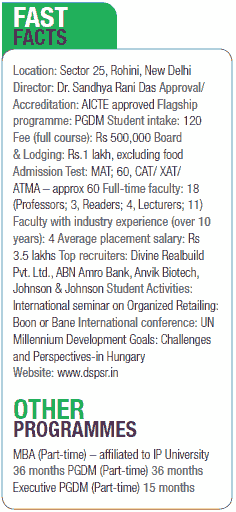 | « Back to article | Print this article |
B-school review: Delhi School of Professional Studies and Research
Earlier this month Careers360 issued the top 50 B-school rankings in the country. The magazine also reviewed 25 institutes, along with vital information students should be aware of when choosing their B-school.
Today we feature Delhi School of Professional Studies and Research, New Delhi and its courses.
Usually, B-schools begin with a lot of pomp and show. But DSPSR began in 1999, with a meditation session," says Dr Ajay Kumar Singh, president, with a hint of pride. The details of the school's academic activities come in slow and sparsely. As an initiative of the "Divine" group, we see more emphasis on "spiritual enhancement." A calendar of "Shri Shri" Ravi Shankar adorns his room, and all students mediate compulsorily for 15 minutes every day, during the Personal Contact Forum class.
DSPSR was launched with a BBA programme. The MBA programme affiliated to the IP University commenced in 2004 and was replaced by the AICTE-approved PGDM programme in 2008, which has the flexibility to modify and develop its course and curriculum.
Though the institute claims to offer six areas of specialisation including Retail, Global Business & IT Management, we could find students specialising only in Finance, Marketing and Human Resources in the graduating batch.
The summer training project happens after the end of the second semester and the institute uses cases as well as role plays to teach. With some faculties taking on as many as 15-16 lectures a week, their efficacy remains circumspect.
Other reviews:
- Narsee Monjee Institute of Management Studies, Mumbai
- Symbiosis Institute of Management Studies, Pune
- Mudra Institute of Communications, Ahmedabad
- Amrita School of Business, Coimbatore
- Amity Business School, Noida
- Acharya Institute of Management and Sciences, Bangalore
Courses and curriculum
According to students, the school must improve residential facilities and increase industry visits. In terms of the infrastructure, the computer centre, divided into two labs with 65 computers each, is a centre for the CAT.
"We have a participative style of decision making in the institute where we meet and discuss all the issues," says Anmol Soi, Advisor (MDP). The college is working towards being accredited by the UK's ASICS by 2012.
It has also signed MoUs with five institutes, two in the UK and one each in Hungary, Slovak Republic and Australia. However, the contribution that these MoUs have in imparting education to students or the degree and depth of participation by these five foreign universities could not be ascertained. Five students have been selected to study for one semester as part of student exchange programmes in Hungary and Slovak Republic of a programme strength of 240. This costs extra.
Some students actively participate in organising and presenting papers at international conferences, organised jointly with these international colleges. DSPSR hopes to become a level three certified institute with the Chartered Management Institute (CMI), UK through its association with ICE, UK. This would enable them to offer a six-month certificate programme for a select group of 45 PGDM students and have access to international placements.
Moving forward, the faculty needs an overhaul with emphasis on learning, research and consulting and development and learning for students. DSPSR must also broad-base its placements. As we see it, most students are absorbed in group companies.

